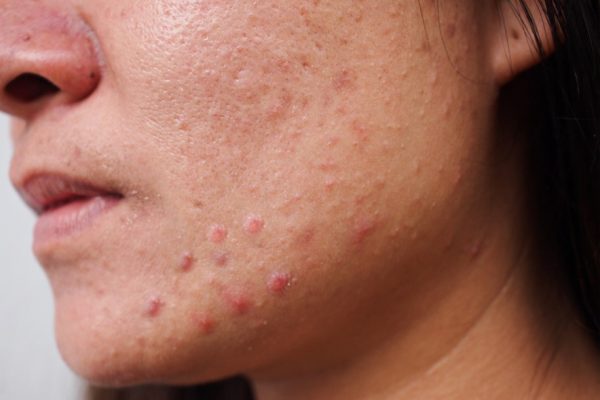Maskne (Mask Acne) Is A Real Thing: A Dermatologist Tells Us How To Combat It

Maskne (Mask Acne) Is A Real Thing: A Dermatologist Tells Us How To Combat It
Posted on Fri Jul 10, 2020
Maskne: when the area of the face regularly in contact with a face mask develops acne. With the massive increase in mask-wearing across all sectors of society, maskne is becoming more and more well-known, despite having been around since the inception of clinical face masks.
Maskne can be a little embarrassing as it is often quite obvious and might form a noticeable circle around your mouth and nose.
We teamed up with Dr Hiba Injibar, a Consultant Dermatologist who practices at Dermasurge Clinic on Harley Street, to find out how maskne can be combatted.
What causes maskne?
‘Maskne is caused when people wear face masks that wrap tightly around the face for long periods of time,’ says Dr Injibar. ‘More specifically, it is caused by occlusion, which is when something causes a blockage in the pores.’
“Change your face mask at least twice a day… use oil-free skincare products… cut down on dairy and sugar… and reduce stress.”
Occlusion is defined as a blockage, which is exactly why dermatologists always recommend avoiding things that block your facial pores, for example heavy makeup. It’s the same with face masks!
Article: Tips on avoiding general acne
‘Although maskne has been around for a long time, it has recently gained traction as dermatologists are seeing more and more patients with the symptoms. Typically, patients present with inflamed acne around their mouth and nose, and they almost say they wear face masks often and for prolonged lengths of time.
‘As coronavirus has drastically increased the numbers of people wearing face masks for extended lengths of time, this problem is becoming more prevalent,’ says Dr Injibar.

How can maskne be prevented?
Dr Injibar has a few tricks up her sleeve for preventing maskne; ‘I would recommend changing your face mask at least twice a day. This will reduce the amount of oil that rubs over your face, and also allows you to clean your face in between masks.
‘There are several things you can do to clean your face, such as washing it with water and an oil-free foaming acne cleanser.
‘If this isn’t possible, I’d suggest using glycolic acid pads. I like NeoStrata glycolic pads, but there are a number of pads out there. Just make sure you don’t use more than a 10% concentration!’
How can maskne be treated?
‘Well, treating maskne is really the same as treating any other form of acne. It’s simply the cause that differentiates it,’ says Dr Injibar.
‘I tend to recommend using oil-free skincare products, cutting down on dairy and sugar and improving diet in general, trying to reduce stress and generally letting your skin breathe as much as possible. If you’re suffering from acne or another skin condition, I’d recommend visiting a specialist, even if just for peace of mind.’
TL;DR
Maskne is caused by occlusion of the facial pores (blocking them). To prevent it, try to change your mask at least twice a day and wash your face with glycolic acid pads. You can also prevent it by eating healthily, reducing stress and using oil-free skincare products.
Oryon’s monthly content newsletter
Sign up to get a monthly roundup of healthcare articles like this one, straight to your inbox. Just scroll down on this page and select which brand you’d like to hear from – we’d suggest all three but it’s up to you! Oryon Connect links you to trusted healthcare practitioners for free, Oryon Imaging offers affordable diagnostic scans in London, and Oryon Develop runs healthcare education events for professionals and for anyone interested in learning something new.
Share this article
Most Recent
Posted on Thu Jul 3, 2025
How Long Does A Shoulder MRI Take?
Posted on Thu Jul 3, 2025
Posted on Tue Jul 1, 2025
Stay up to date
If you’re interested in keeping up with what we’re doing, just leave your email address here and we’ll send you periodic newsletters and other updates.





